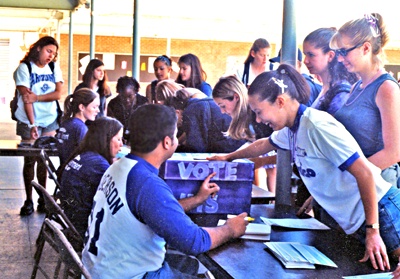All Nonfiction
- Bullying
- Books
- Academic
- Author Interviews
- Celebrity interviews
- College Articles
- College Essays
- Educator of the Year
- Heroes
- Interviews
- Memoir
- Personal Experience
- Sports
- Travel & Culture
All Opinions
- Bullying
- Current Events / Politics
- Discrimination
- Drugs / Alcohol / Smoking
- Entertainment / Celebrities
- Environment
- Love / Relationships
- Movies / Music / TV
- Pop Culture / Trends
- School / College
- Social Issues / Civics
- Spirituality / Religion
- Sports / Hobbies
All Hot Topics
- Bullying
- Community Service
- Environment
- Health
- Letters to the Editor
- Pride & Prejudice
- What Matters
- Back
Summer Guide
- Program Links
- Program Reviews
- Back
College Guide
- College Links
- College Reviews
- College Essays
- College Articles
- Back
Should we really let teens of sixteen and seventeen vote? MAG
Teenagers are constantly reminded that they are the future of the United States of America. We are told that it is our duty to be aware of what is happening and to invent solutions to the problems previous generations have created. Various news sources and political issues are thrust into our hands with the expectation they will be deciphered and absorbed. Current events and national matters are discussed in classrooms, in peer groups, and even at the dinner table. Through all this exposure, modern-day teens have begun to thrive when it comes to forming opinions, sharing ideas, and even acting on them. Although today’s youth have been exposed to and educated on politics, with many even becoming more politically fluent than their predecessors, they are missing one vital piece to their governmental experience: the right to vote.
Several arguments insist that 16 and 17-year-olds would prove less motivated and less educated when it came to voting, but a simple look into their everyday lives would provide more clarity into the falsity of these claims. Classrooms are filled with young adults sharing ideas and raising necessary questions. Lunch times are spent sharing current events and brainstorming creative solutions. With smartphones in pockets, today’s youth have more access to information than any generation before them. In this modern age, teenagers are more than ready to not just vote, but to become educated members of society. So why is there so much resistance?
Many teachers, parents, and government officials argue that teens don’t have the ability to look into the future and think about their decision’s impact on others. They insist that teens don’t have the life experience to vote, but what we’ve seen in the news for the past few years tells a different story. Sixteen- and 17-year-olds know how to face the stress of school shootings, climate change, severe political divide, and deciding what they want to do with the rest of their lives. This requires deep thinking and good decision-making skills, as well as the ability to come up with creative solutions and act on them. Exactly the requirements (if not more) than we expect voters to fill. The same teenagers that we consider too irresponsible to vote can legally be emancipated, register as an organ donor, or obtain a passport without parental consent.
How is society expecting teenagers to shoulder the responsibility of behaving like an adult, without being treated like one? If 16- and 17-year-olds were allowed to vote, it would not only show that society acknowledges the involvement teenagers already have in politics and the responsibility they display in their everyday lives, but it might create a new, broader mindset concerning how we can help not just the United States, but the world.

Similar Articles
JOIN THE DISCUSSION
This article has 0 comments.
